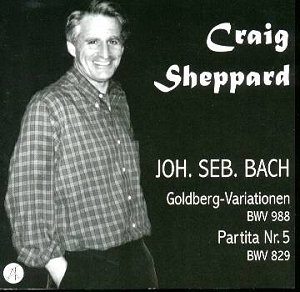Recorded live in concert at the Philharmonie in Berlin
in April 1999 this performance of the Goldberg Variations contrasts
profoundly with that by Jean Louis Steuerman, recorded two years later
in London, which I’ve also recently reviewed. It’s not just a question
of repeats that means that Craig Sheppard takes less than forty minutes
and Steuermann more than seventy-three. The difference between them
goes beyond mere temporal considerations, significant though these can
be. But whilst Steuerman’s sometimes notable pianism is put to the service
of an intensely meditative, frequently static, muse, Sheppard, with
no loss of depth, invests the Variations with colour and animation,
freshness and vitality. The two approaches are musically oppositional
and whilst Sheppard isn’t invariably convincing in all he does his is
the performance that comes closer to the core of the music, that responds
more appropriately to its reflection and dance, which discovers more
fruitfully its seriousness without becoming sententious. It’s also an
approach I found intensely sympathetic and likeable.
If Sheppard has a fault it is an overuse of the stabbing
staccato, and he serves notice in the course of an otherwise affectionate
and beautiful statement of the Aria that the left hand’s animating propensities
will be thus used. The first variation is full of tonal gradation however
and infectious and I delighted in the animation, the brio and drive
of the Fourth. The excellence of the Fifth is followed by a rather staccato
sixth – the air of deliberation and stuttering progress is a disappointment
though this is clearly a thoroughly thought-through interpretation.
It sounds directionless to me. The second canon likewise never quite
comes to life whereas the fourth canon is a thoroughly convincing and
beautifully played affair. In the Thirteenth Sheppard is full of decorative
and rococo charm though ones that gather in strength but I was less
convinced by the succeeding fourteenth. In his inspiring review of a
Quintet of Goldberg recordings recently, colleague Christopher Howell
refers to Sheppard’s playing of this variation as "messy"
and here, as so often elsewhere, I find myself echoing him. In the Fifteenth
variation I found Sheppard’s noble dignity rather too heavy but I greatly
admired the subtle rhythmic bite with which he vests the Eighteenth.
Freshness and animation, prime Sheppardian constituents, drive through
20 and a thrilling wit and clarity radiates from 23 as he relishes the
hands’ discourse and brings out the left hand lines. The Twenty-fifth
is the so-called Black Pearl and Sheppard is suitably intense and but
at a relatively flowing tempo. From here in Sheppard’s tonal beauty
makes its mark – number 26 is especially rounded tonally. I very much
share Christopher Howell’s reservations concerning variation 29 however.
On record and in concert Angela Hewitt, for one, has shown how intensification
does not necessarily mean over aggressive playing of this kind. When
however the Aria da capo is heard it is with a proper sense of visionary
return.
A Washington performance of the Fifth Partita is included.
It’s somewhat afflicted with mechanical bumps in the sound and the central
Sarabande is very slow and whilst of almost evasive delicacy might well
sound etiolated to less sympathetic ears. I admired the clarity of voicings
and the vivacity of the Gigue. But the Goldberg Variations is the focus
of interest and I would certainly recommend Sheppard. He has tonal resources
that are at the service of the music and never deployed for narcissistic
effect; his is a Goldberg, as I suggested earlier, of colour and animation
and it’s one to which I know I shall return.
Jonathan Woolf
see also review
by Chris Howell
